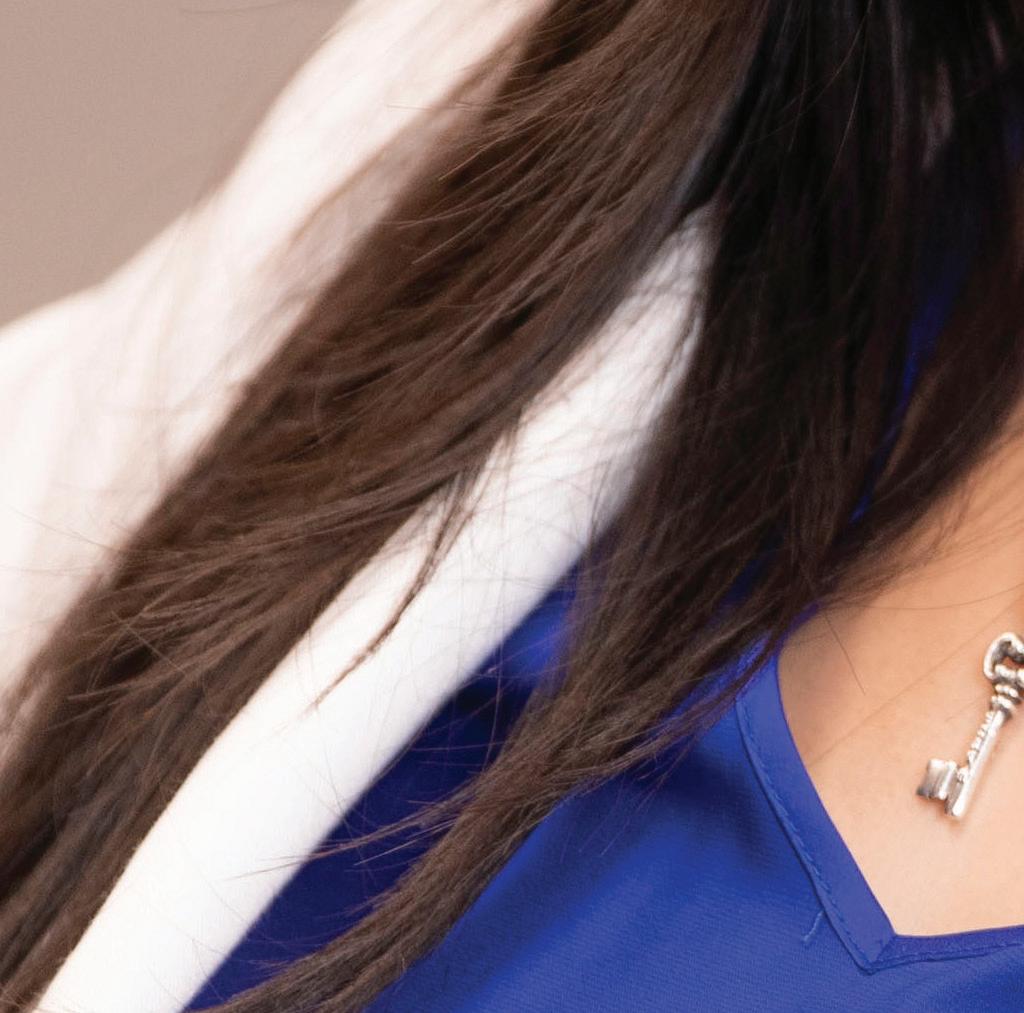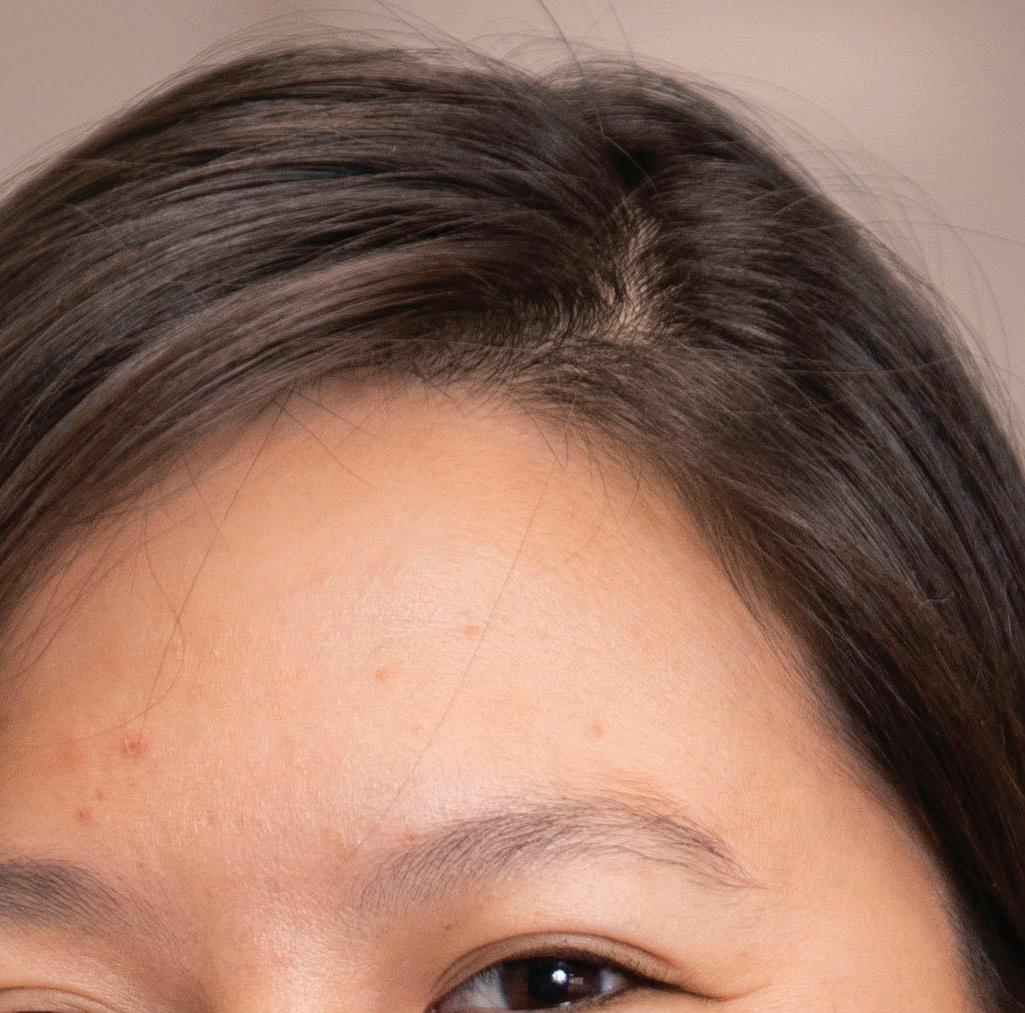HEAR ME OUT, CARL THE CASE OF THE 87% NURSING GOES VIRAL
How Chris Townsend Found His Groove
An assistant professor does the unexpected to bring people together amidst cultural differences.


HEAR ME OUT, CARL THE CASE OF THE 87% NURSING GOES VIRAL
An assistant professor does the unexpected to bring people together amidst cultural differences.

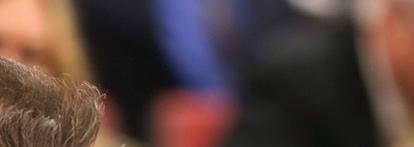

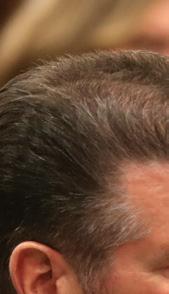






TTUHSC says “see you later” as Tedd L. Mitchell, MD, transitions fully to Chancellor of the Texas Tech University System.



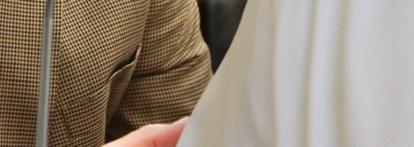




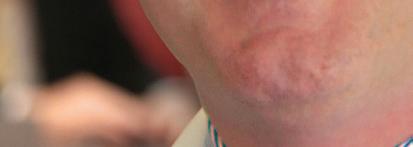


















Growing up in a sharecropping family, Chris Townsend, PhD, LPC, didn’t like cotton. So imagine how he felt moving to West Texas surrounded once again by king cotton.
By Kara BishopWhen Jeramy Davies, MLS, decides to participate in a bone marrow match on campus, he doesn’t realize saving someone’s life is going to end up saving his own.
By Glenys Young5 Scope
The Texas nursing shortage could be solved one Girl Scout at a time.
Fitting hearing aids can be tricky. Enter CARL.
29 Rounds
The physician’s administrative duties take on a whole new meaning when wearing full body leather and a bird beak.
Mallory McGarry Brown, PharmD, doesn’t feel comfortable calling her leadership skills successful. We’ll let you be the judge.
Chris Townsend, PhD, LPC, assistant professor in the School of Health Professions Department of Clinical Counseling and Mental Health, juggles research groups, writing groups, directing the new Your Life Behavioral Wellness Clinic, and teaching distance education courses. In his spare time, he transcends cultural barriers to bring people together.

Growing up, my brother got all the cool stuff — like the chemistry set he received one Christmas. I couldn’t wait to get my hands on it — which I eventually did. I was burning things and mixing things. Mom had caustic ingredients on the kitchen ceiling.
This was a time when, as a girl, I was expected to want and play with an Easy-Bake Oven — which I did. But I was also very curious about the world around me and that naturally drew me to the sciences. Thankfully, my parents embraced this.
We’ve come a long way in expectations of who or what we can become as individuals and that is reflected in our academic realms as well. TTUHSC is now leading the way in academic medicine and in fulfilling our charge to deliver quality health care. Much of our recent growth came under the leadership of Dr. Tedd L. Mitchell, who set our university on a very forward-thinking trajectory.
It’s now our responsibility to continue this momentum. But what does that mean? Most of us remember the physics definition — mass times velocity — and the more you have of either, the more momentum you gain. However, from a leadership perspective, momentum is a call to continued action.
Universities often approach a presidential transition with a holding pattern mentality. “We’ll just keep things afloat until the new president comes and brings their new identity, etc.” It’s critical that we don’t become one of those universities. TTUHSC is a very exciting and dynamic place to be right now. We know our values as an institution, and the kind of leader we are looking for will be one who aligns with our values.
In the meantime, our role as leaders (those who want to influence others toward achieving goals) is to continue doing what we do best: serving in a way that allows our great university to fulfill its mission. We will continue to identify barriers standing in the way of what we need to accomplish. We will continue to roll up our sleeves and work as a team.
And through our momentum, TTUHSC will become even greater.
Lori Rice-Spearman, PhD INTERIM PRESIDENT TEXAS TECH UNIVERSITY HEALTH SCIENCES CENTER
Universities often approach a presidential transition with a holding pattern mentality. ‘We’ll just keep things afloat until the new president comes.’ It’s critical that we don’t become one of those universities.
Getting out of your comfort zone is never an easy thing to do — and we did it with this issue of Pulse.
I’ve always been one that chose the 300-page novel over the comic book, but Jeramy Davies’ story seemed perfect for a graphic novel, so we tried it. We hope you enjoy this take on his story as much as we enjoyed creating it. We also open a dialogue on diversity and inclusion and the importance of bringing people together through a mutual understanding of differences with a story on Chris Townsend, PhD, LPC.
And, of course, it was no easy feat saying goodbye to Tedd L. Mitchell, MD, as the university’s longest-serving president. We will all miss him, but thankfully he’s just across the Marsha Sharp Freeway at the TTU System — and committed to supporting TTUHSC as we continue on an upward path.
Enjoy!
— Danette Baker, MA EDITOR, PULSE OFFICE OF EXTERNAL RELATIONSI enjoyed reading the feature on Dr. Andy Hansen. I actually accompanied him to the Jarvik heart training in Salt Lake City, Utah, (I worked for Methodist Hospital at the time) and watched him practice the procedure on a calf. He is a great surgeon and good friend to this day. Those were exciting times for Lubbock, Texas! Congratulations on the new and impressive look for Pulse magazine.
— Brent Magers, FACHE, FHFMA, CMPE, EXECUTIVE ASSOCIATE DEAN, SCHOOL OF MEDICINE AND CHIEF EXECUTIVE OFFICER, TEXAS TECH PHYSICIANS
I just got a copy of the magazine in the mail. It looks amazing! The issue was so well put together. I recognized a lot of students in the magazine, and it was interesting to read their perspectives on TTUHSC as well. Thank you all so much for this opportunity. It was a pleasure working with you all.
— Jennifer Lilley THIRD-YEAR MEDICAL STUDENT FEATURED IN THE SUMMER 2019 ISSUEPulse staff polled readers following the Summer 2019 issue on their opinion of the redesign. Here is a sampling of the answers:
“I like it.”
“Nice looking layout and a good effort for publication. However, I’m not an enthusiastic alumnus.”
“Love it and eager to read issue.”
“Eh.”
“It is a high-quality magazine. TTUHSC should be proud of it.”


“Outstanding.”
“I think it is more appealing now.”
“Seems OK.”
“I love the redesign. It’s much more visually interesting and easier to read.”




“Haven’t noticed it — but if you’re happy, I’m happy.”
“I didn’t notice it was redesigned.”
Vol. 30, No. 1
EDITOR
Danette Baker, MA
SENIOR EDITOR
Kara Bishop
DESIGN

Jim Nissen
WRITERS AND CONTRIBUTORS
Garrett Campbell, Suzanna Cisneros, Carolyn Cruz, Federico Gastaldi, Neal Hinkle, Nancy M. Hood, Kami Hunt, Jo Grant Langston, Tessa Meriwether, Koren Shadmi, Caroline Wahl, Melissa Whitfield, Glenys Young
ADMINISTRATION
INTERIM PRESIDENT
Lori Rice-Spearman, PhD
INTERIM VICE PRESIDENT OF EXTERNAL RELATIONS
Ashley Hamm
ASSISTANT VICE PRESIDENT OF EXTERNAL RELATIONS
Mattie Been, Amarillo
Jessica Zuniga, Permian Basin
CHIEF ADVANCEMENT OFFICER
Cyndy Morris
GIFT OFFICERS
Peyton Bivins, Smiley Garcia and Clifford Wilkes
CONTACT US
pulse@ttuhsc.edu
TTUHSC External Relations 3601 Fourth Street STOP 6238 Lubbock, TX 79430-6238
LETTERS TO THE EDITOR
Do you have an opinion? Share your thoughts on this issue in the follow-up online survey email. (If you are not receiving the survey, please send your current email address to pulse@ttuhsc.edu to be added.)
Pulse is published twice a year. Content may be reprinted only with editor’s permission. Discrimination or harassment based on race, color, religion, sex, national origin, age, disability, genetic information, status as a covered veteran or other legally protected categories, class or characteristics is not tolerated. Pulse is distributed in compliance with the State Depository Law and is available for public use through the Texas State Publications Depository Program. In compliance with HB 423, Pulse is available in electronic format. If you no longer want to receive the printed version, please notify the editor in writing.





































By 2030, Texas is anticipating a shortage of 45,000 nurses — and is ranked as the state with the second largest shortage in the country, according to the National Center for Health Workforce Analysis. The School of Nursing is combating this statistic in creative ways — including a partnership with select service units of Girl Scouts of the United States of America.








The School of Nursing has invited both Girl Scouts of the Desert Southwest in the Permian Basin and Girl Scouts of Texas Oklahoma Plains in Lubbock to educational events for fourth and fifth grade Girl Scouts on the nursing profession. At the end of these events — which cover topics including CPR training, situational awareness, bullying, and personal hygiene — Girl Scouts earn the “TTUHSC & Me:


All that I can be!” badge.









“Coming in low over an eastern New Mexico hospital, we are there to pick up a man in his late 50s in critical condition from a massive heart attack. We have a 45-minute flight back to Lubbock where he can get world-class care from a team of cardiologists at UMC Health System. We just have to get him there alive. The medical protocol is to give atropine for symptomatic bradycardia, but the doctor is not there. I am. For that instant, a critical medical decision is solely up to me. I’m thinking, ‘A patient with a heart rate of 24 to 26 beats per minute is alive.’ It’s a critical call. What would you do?”
With that, Terry Hill, DNP, (Nursing, ’19) has the undivided attention of 150 undergraduate students in the School of Nursing. His stories from days in the emergency room, and later as a flight nurse, provide real-life scenarios that make Hill a popular professor and inspire his students. “Nursing is a very personal profession because you’re taking care of a human who is relying on you,” he said. “If you want to teach nursing well, you better make it personal.”
Hill was not always a professor or even a nurse. He started his career as a plant breeder and seed scientist, which required constant travel to look at field trials and evaluate crop performance. One rare evening when he was at home with his family, his wife had an unexpected severe seizure. Hill decided it was time to rethink his career. He also wanted more involvement with people, so he decided to enroll in nursing school.
“Some of what we face as nurses is truly horrifying,” he said. “It takes experience to get beyond some of that trauma and learn to make a good decision. I try to draw the students into a situation with me and make them feel like we’re making real-time decisions about a patient’s care.”


 — By Nancy M. Hood
— By Nancy M. Hood
Madelynn Contreras, left, looks at parts of the brain with fellow classmates in the Harmony Science Academy lab.

“I can eat again,” Shatori Wilson tells Maria Serrano with the ABC news affiliate in Amarillo. “I didn’t realize how crazy I was going not eating my mom’s pot roast!”
Wilson developed a rare disorder that prevented her from swallowing food. The lower esophageal sphincter — closed when not eating to prevent stomach acid coming back up the esophagus — doesn’t relax to allow food to pass to the stomach in patients with this disorder, called achalasia. She had already lost 60 pounds and was desperate for help.
An operation called the POEM (per oral endoscopic myotomy) consists of a doctor inserting a scope through the mouth, tunneling through layers of the esophagus and cutting the muscle restricting the flow of food. An operation of this kind has never been done in the Panhandle. Until now.
Hassan Ahmed, MBBS, MRCSI, assistant professor in the School of Medicine Department of Surgery in Amarillo, performed the first POEM operation in the Panhandle in August 2019. “It’s a commonly performed procedure, you just have to have someone trained to operate with the equipment,” he said.
“Not being able to swallow food, you’re not getting any of the nutrients — there was no nausea involved, I never felt sick. I just couldn’t swallow anything,” Wilson recalled. “Social outings weren’t fun because I couldn’t eat.”
It’s been a slow process of drinking a lot of water, taking small bites and chewing thoroughly, but Wilson is eating again and getting her life back.
I want to be a surgeon,” said Madelynn Contreras, a sixth grader at Harmony Science Academy, which has partnered with the School of Medicine to launch the new Middle School to Medical School Program. “When my mom was little, she was really sick and that makes me want to take care of sick children.”
Stat! The Correctional Managed Care Program’s 30-Years of Service Provides Impressive Numbers
Managed Care currently provides medical, mental health and dental services for more than 33,000 offenders.
37%
OF MANAGED CARE EMPLOYEES HAVE 10-PLUS YEARS OF SERVICE WITH TTUHSC.
Patients are housed in 23 facilities at 18 geographical sites spanning 100,000 square miles of West Texas.
Managed Care conducted 23,713 telehealth visits (primary and specialty) in FY 2019.
The program operates four infirmaries, a 128-bed surgical unit, on-site dialysis, a long-term care unit and psychiatric programs with 1,000-plus beds.
For audiology students in the School of Health Professions, one of the most important skills to master is fitting patients for hearing aids. The procedure requires inserting a probe into the ear canal, which allows clinicians to identify the correct size hearing aid. CARL (Canadian Audiology simulator for Research and Learning) is a 3-D printed manikin simulator used to teach students probe placement. He makes his debut this year with the school’s Doctor of Audiology students in the Department of Speech, Language and Hearing Sciences.

CARL’s ears are silicone and modeled from human CT scan imagery, creating anatomically correct ears.















This camera produces computer images of CARL’s ear canal, allowing the student to visualize the probe.
These short tubes are inserted in the ear before the molding material is inserted in the ear canal.





Students see in real-time how they are inserting the probe on the computer screen, providing instant feedback. The software includes modules for practice and testing and can simulate different levels of hearing loss, information needed to properly fit a hearing aid.

On a Sunday night in 2016, Ninfa Flores was getting ready for the upcoming work week. She had an early start the next day in the Texas Tech University Operations Division — Services. On Monday morning, however, Flores never showed up — she had suffered a stroke and was diagnosed with aphasia.







Flores was refered to the Stroke & Aphasia Recovery Program (STAR) through the Department of Speech, Language and Hearing Sciences and this summer participated in their arts camp. She loves the beach and painted scenes from South Padre Island and the Dominican Republic. The Texas Tech University Public Art Program invited STAR Program members to showcase their art in the Texas Tech University System building, and Flores was excited to see her paintings displayed there — a building she’s very familiar with since she used to supervise the cleaning of it.


TheMaster of Physician Assistant Studies Program celebrates 20 years of serving West Texas with some big numbers.

1 ⁄ 3 of program graduates practice in West Texas.



120 students enrolled in the PA program.
More than




800 graduates from the program practice all over the world.
60 students accepted to the program each academic year out of more than
1,700 qualified applicants.
75% of graduates practice in Texas. Program graduates perform approximately



2.5 million patient visits per year.

Maria Drews, DPT, (Health Professions, ’18) walked into the living room and noticed swelling in the right temple of her 9-monthold son, Lucas. Of course, she took him to his pediatrician and was told to observe it for any changes.

The swelling grew worse so Lucas underwent an MRI. The doctors discovered the mass was retreating from the outer edge of the skull toward the brain — Lucas’ pediatrician wanted him to be admitted overnight for monitoring. While Maria fills out the admission paperwork, she sees a wall of doctors coming into Lucas’ room, one of them mentioning leukemia.
Another MRI was ordered with an oncologist confirming the diagnosis on May 1, 2019. Lucas had acute myeloid leukemia (AML-M7) — a rare form of leukemia most commonly found in children with Down syndrome. The mass on his head that originally caught Maria’s attention was a chloroma: a collection of leukemic cells occurring outside the bone marrow.
Lucas’ diagnosis naturally put the brakes on some of Maria’s plans. She had completed her Doctor of Physical Therapy degree with TTUHSC in December 2018 with plans to participate in the May 2019 graduation. She called her adviser to explain why she wouldn’t be at the graduation ceremony, and then thought nothing more about it as she juggled her full-time job and Lucas’ chemotherapy appointments. Then something unexpected happened.
A few weeks later, Maria receives an email from gift officer Cliff Wilkes asking if the School of Health Professions could bring the graduation to her. “I just didn’t understand — it was so amazing,” she recalled. When Maria saw Dean Lori Rice-Spearman, PhD, (Biomedical Sciences ’86) — now TTUHSC interim president, provost and chief academic officer — coming toward her with regalia and a
Maria Drews, DPT, wasn’t able to attend her graduation after her son was diagnosed with acute myeloid leukemia — so the school brought the graduation to her.
diploma, the emotion overwhelmed her. In the hallway of her workplace, Maria received her diploma. “My journey, my education, my baby boy’s survival was important to my school … I can’t even describe how that felt, not only to me but also to my friends, family and co-workers. I mean, who does that?”
Lucas received a bone marrow transplant on Oct. 17, 2019, and has check-ups twice a week.
Q. How did you first become involved in cheerleading?

A. I had a couple of friends at school — Downers Grove South High School in Chicago, Illinois — who were looking for a guy to be on their cheer team. Our high school had a coed team, and they knew that I used to be a hip-hop dancer, so they thought I’d be pretty good at it. So, I just said why not, and I tried out for the team.


Q. How did you become interested in nursing?
A. I knew I wanted to do something with the medical field. I actually started working as a transport aid at UMC Health System to get some medical experience. I noticed how hard-working, ethical and empathetic the nurses were. I talked to them a lot throughout my shifts over the next year and a half. From there I just loved the nurses at UMC and wanted to strive to be just like them.
Q. What nursing school program are you in?




A. I am in level one of the Traditional BSN program in Abilene.
Q. What type of nurse do you want to become and why?

A. My main goal would be to become a cardiac intensive care unit nurse for a couple of years and then the ultimate goal would be a travel nurse while I’m still young and don’t have any full commitments.

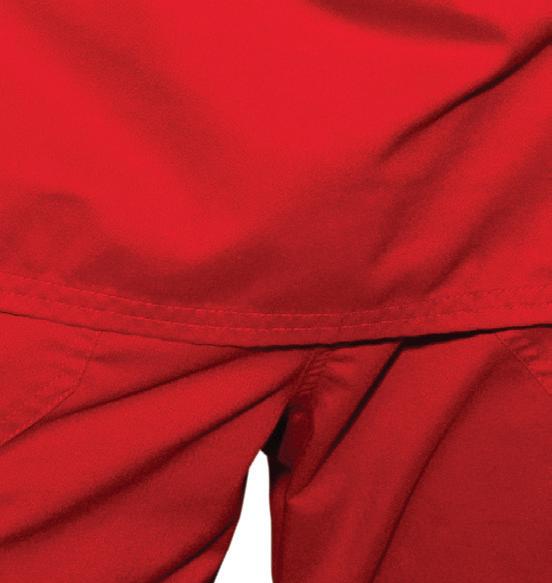



Q. How has cheerleading prepared you for nursing school?

A. It has taught me not to give up. Coming to college in Texas, I wasn’t an amazing cheerleader, but I went through a lot of obstacles mentally and physically throughout my career that made me tough. I knew if I started something, I would not give up and stop halfway through.
 - By Tessa Meriwether
- By Tessa Meriwether
Two-time national champion Chris Quiaoit talks about his two favorite passions.
I originally wanted to play football, but as a 5’6’’ Asian, I discovered I could be a Division I athlete with better scholarships as a cheerleader.










The human microbiome is complex and research is ongoing on the effects of probiotics in everyday health. TTUHSC researchers may have found a novel use for these live bacteria: to fight infectious bacteria in burn patients. “The opportunistic pathogen Psudomonas aeruginosa grows in the burn wound and then spreads within the body of the burned patient, leading to sepsis,” said Abdul Hamood, PhD, a professor in the

The Free Clinic opened its doors in 2009 and is a student-run facility for the uninsured citizens of Lubbock. Operation hours are from 6 p.m. to 10 p.m. every Wednesday night at the Lubbock Impact community outreach facility.
THE CLINIC:
Total patient visits: 13,000 (2009-2019)
Total volunteers: 1,500 (2009-2019) medical students
450 faculty members
Total exam rooms: 14
THE SERVICE AREA: More than 18% of the Lubbock population is uninsured
22.5% of the Lubbock population is below the national poverty line
Meredith Gavin, fourth-year medical student, couldn’t believe she’d won the 2019 TTUHSC Clinical Research Institute Medical Student Award for Outstanding Scholarship — she is the first recipient as the award was established in 2019.
Department of Immunology and Molecular Microbiology. To make things more complicated, this pathogen is antibiotic resistant. To prevent the infection from occurring, Hamood and his team are using probiotics.
The study, “Application of Lactobacillus Gasseri 63 AM Supernatant to Pseudomonas aeruginosa — Infected Wounds Prevents Sepsis in Murine Models of Thermal Injury and Dorsal Excision,” was published in the August 2019 issue of the Journal of Medical Microbiology.
Michael Galloway, DO, pursued robotic surgical training for one reason: to prove it wasn’t as good as traditional methods. The attendings at Wright State Physicians Women’s Healthcare in Dayton, Ohio, were using the robotic systems for gynecological surgeries, causing residents to miss out since they weren’t trained to use the equipment. Galloway, who considered robotics to be a “fancy new car” everyone was chasing, found himself backtracking after his training. Robotic surgery had many benefits to the patient — shorter recovery time and hospital stay — but also to the surgeon — less physical toll and decreased margin of error.
A passionate educator, Galloway struck a deal with the attendings: if he trained his residents in robotic surgery, they could assist with procedures. Finding an outdated robotic system in a closet while serving as the director of the obstetrics and gynecology program at Wright State University, he renamed the storage room the Residency Robotic Training Center and got to work.
In comparison to laparoscopic surgery, robotic systems have two lenses for multidimensional perspective, whereas laparoscopic implemented the fulcrum effect.
Over the next 12 years, Galloway would build a state-of-the-art robotic residency training facility. What started as a pipe dream he’d sketched out on a napkin, became a renowned training program where residents walked away with a well-rounded education in robotic

vaginal and abdominal surgeries.
“I want my residents to be competitive as well as able to serve the patients’ needs,” he said. “And it’s hard to do that if you can only perform one type of surgery.”
Gary Ventolini, MD, dean in the Permian Basin was on faculty at Wright State University from 2005 to 2012 and watched Galloway develop the residency training program. When Moss Hampton, MD, retired in January 2019, Ventolini reached out to Galloway.
The new chair of the Department of Obstetrics and Gynecology in the Permian Basin tried to prove robots wrong.
Galloway joined TTUHSC in July 2019, moving 1,300 miles to serve as professor and chair of the Department of Obstetrics and Gynecology and as director of the OB-GYN residency program in the Permian Basin. Galloway hopes to strengthen the gynecology side of the department and incorporate robotics into surgical training. Based on his previous track record, we can expect positive changes through the lens of what is in the best interest of both patients and residents.
Brianyell McDaniel Mims had one question for her college adviser: “What are my career choices?”
She enjoyed science and chose a major in biochemistry. Her adviser helped her apply for the RISE (Research in Science and Engineering) program, which gave Mims an opportunity to work in a science laboratory.
“I had no idea I could have a career in science, and once I started working in the lab, I knew I wanted to do this for the rest of my life,” Mims said.

Mims is pursuing her PhD in biomedical science, specifically in immunology and infectious diseases. She works in the lab of Matthew Grisham, PhD, (Biomedical Sciences ’82), professor and chair in the Department of Immunology and Molecular Microbiology. Mims is the first TTUHSC PhD candidate to earn the NIH F31 Pre-Doctoral Fellowship Award.

1It’s aggressive and hard to prevent.
Options for prevention such as screenings and exams are all but nonexistent for ovarian cancer. There are few symptoms, other than cramping, making early diagnosis difficult. A patient with ovarian cancer is likely to already be in stage 3 or 4 of the disease upon diagnosis.
2It responds well to chemotherapy, at first.
The cancerous tumors on fallopian tubes or ovaries generally respond well to therapy. “However, in more than 70% of patients in remission, there is re-occurrence,” said Komaraiah Palle, PhD, associate professor in the Department of Biotechnology. Dormant cancer cells do not respond to chemotherapy. These dormant cancer cells then become active and are now therapy-resistant, leading to high percentages of ovarian cancer fatalities.
3Extramural funding supports search for solutions.
Palle received a $200,000 grant from the Cancer Prevention and Research Institute of Texas to treat both active and dormant cancerous cells simultaneously to prevent re-occurrences of this deadly disease. “We’ve found a protein target and small compound inhibitors, that, when combined with chemotherapy, should accomplish this goal,” Palle said.
In 2019 and 2018, Whit Walker Jr., MD, assistant professor of internal medicine in Amarillo, traveled to Liberia with Samaritan’s Purse International Relief to teach family medicine residents about Ebola and its treatment. Working with the global humanitarian organization, Walker’s teaching audience took a slightly different turn on his 2019 trip — he also began teaching Liberian pharmacy students about Ebola and other illnesses prevalent in the area.
“During a rotation with residents, three pharmacy students asked if they could join us,” Walker said. “I scheduled a lecture thinking only these three would attend. Ten came. They were eager to learn.”
The students impressed Walker, and he wanted to do more upon his return to Amarillo. Walker collaborated with Jill Frost, PharmD, assistant professor in the Department of Pharmacy Practice, students and other faculty to create an online lecture series. Now, every two weeks, Walker, along with faculty and students, reach across the globe to a room full of aspiring pharmacy students in Liberia where, oftentimes, it’s standing room only.
The Liberian students aren’t the only ones learning, said Rachel Bassinger, PharmD, assistant professor in the Department of Pharmacy Practice. “This experience is very eye-opening for our students. Not only are they sharing what we do in the states, but they are becoming more culturally aware. They see how motivated the Liberians are to learn, in spite of the obstacles in their way.”
Thomas Abbruscato, PhD, and Luca Cucullo, PhD, were awarded a $1.36 million federal grant to assess the affects of vaping on the brain.
RESEARCHERS COMPARE AFFECTS OF VAPING AND CIGARETTES

“We’re looking at the early markers of injury from emerging tobacco products like vaping devices and comparing it to those of tobacco smoke. Finding these early markers will allow providers to deal with the forms of toxicity found in patients quicker.”
- THOMAS ABBRUSCATO, PHD CHAIR, DEPARTMENT OF PHARMACEUTICAL SCIENCES
The quest to bring people together on common ground is not fail-proof, but is giving up ever an option?
By KARA BISHOP Photography by NEAL HINKLEChris Townsend, PhD, LPC, walked slowly toward his office. His mind went back to his grandparents and mother living through the civil rights and Jim Crow era. People who had worked hard and come a long way to help him on his journey to success. He could not believe this was happening.
He had moved to Lubbock from High Point, North Carolina, in January 2018 to join TTUHSC as a faculty member in the School of Health Professions, and, a year later, was named director of the university’s newly established Your Life Behavioral Wellness Clinic. The clinic is scheduled to open this year and will offer mental health services to children and adults in the community.
As a licensed counselor, Townsend knew nothing good would come from retaliation; yet he was struggling to
squelch the childhood anger that came rushing back. He was tired of mistreatment simply because of the color of his skin. He needed to fight for what was right. His family would expect him to stand for truth no matter what it cost him.
Almost on cue, he received an email from the university president promoting TTUHSC’s new values-based culture. He took a few calming breaths. “Let’s see if this institution will uphold these values they so visibly promote.” He purposefully walked to the human resources office.


Townsend was generally an amicable person, with a favorite response to just about anything: “Groovy.” But shortly after arriving in Lubbock, he was crossing the parking lot after work one day when a group of fellow TTUHSC employees motioned a car toward him, laughing and taunting, “Yeah, run him
over!” Perceiving their action to be racially motivated, he decided this time he wasn’t going to ignore it.






The Townsend family started sharecropping in Dillion, South Carolina, during the late 1800s.
In January 1865, General William T. Sherman issued Special Field Order No. 15, which granted each freed family 40 acres of land. Their newfound taste of freedom quickly soured when President Andrew Johnson returned all land under federal control back to the original owners. Most freed slaves
The teachings of Chris Townsend’s grandfather, grandmother and mother instilled in him a deep purpose to serve humanity. He stands in one of the rooms under construction in the new Your Life Behavioral Wellness Clinic knowing they’re proud of his accomplishments.




























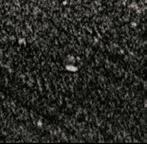
worked as laborers for plantation owners to whom they were originally enslaved. These labor agreements included a payment, usually one-third, of the crop back to the land owner at harvest. Often this was used as an opportunity for land owners to cheat the sharecroppers, breaking agreements unjustly.


At only 8 years old, Hettie Townsend was working in the fields. “When you could tell the difference between the cotton plant and the weed, you worked,” she said. She would pick cotton for about 10 years, and although farming caused her to miss many days of school, Hettie managed to graduate high school on time. She wanted a better life, asking her parents’ permission to pursue opportunities in the booming textile industry in High Point, North Carolina. Losing a worker in the fields was a great sacrifice for her parents, but they let her go with the hope that she and her future children would have a life that didn’t involve cotton.
Life wasn’t kind to Hettie. As a single young girl on her own, she quickly found herself with a baby in an unsafe situation. Domestic violence made her fearful for the well-being of both herself and her son, so she fled temporarily to the projects where she raised her son by herself. Chris often provided words of comfort to his mother during these times, later joking that this is where counseling selected him, rather than the other way around. The projects became their refuge to take safety in when they needed to get away for a while. “It was a great place to hide,” Chris said. “My dad couldn’t find us.” Yet, anger toward his father, and the world in general, would follow him throughout childhood.
Hettie worked as a seamstress and cooked meals for the needy, often taking Chris with her to deliver them.


Her bedridden next-door neighbor, affectionately known as “Pop,” would watch 5-year-old Chris when she needed to work. It was a mutually beneficial arrangement — Pop was alone with no family, and Chris needed wisdom from a father figure. Pop would share his Meals on Wheels dinner with Chris and together they’d watch “The Price is Right.” Chris would also change Pop’s bedsore bandages and empty his urine jug. Chris still remembers unwrapping the putrid bandages uncovering horrific skin damage. “Mom taught me how to change his bandages, and in turn, continually taught me to serve all and never think more highly of myself than those around me,” Chris said. “You become pretty self-sufficient at a young age in the circumstances we were in.”
Moving permanently to the projects when Chris was in first grade, meant attending Northwood Elementary, a predominantly white, privileged school district zoned to include the Daniel Brooks Housing Projects where he and his mother now lived. Hettie worked hard to create a new life for Chris with tough love, guidance, safety and support, fighting to eradicate the horrors of the trauma they had both been exposed to. Anger directed at his father led to anger with others, and
Chris was soon labeled by his teachers as a child with behavioral issues. “By today’s standards I might have been considered behaviorally emotionally disturbed or oppositional defiant in counselling terms,” he said. Then, in fifth grade, he met Mrs. Hart.
Mary Ann Hart grew up in the mountains outside of Clintwood, Virginia, a diverse coal-mining neighborhood filled with Hungarian and Italian immigrants where no one paid much attention to cultural differences. She was warm and unwavering in her belief that any child could accomplish great things no matter their circumstances. Hart’s grandfather knew a black man who had been a slave, so he taught her to love everyone and never disparage another because of their differences. She took one look at Chris, knew exactly what kind of trouble he was, and believed in him anyway.
Hettie saw that Hart’s belief in her son was almost identical to her own, and knew she was looking at a teacher who could put Chris on the right path academically. “You do what you need to do to get him where he needs to be,” Hettie told her at the beginning of school.
Hart immediately put Chris to the test. In fifth grade, students were eligible to be on safety patrol. The safety patrol would monitor the hallways and make sure students got to class. They wore special vests and all the students thought safety officers were cool. Chris wanted to be on safety patrol. He wanted it bad. Nervously, he asked Hart. She smiled down at him and said, “You get your behavior in check, stop disrupting class and breaking the rules for the last half of the year, and I’ll put you on safety patrol.” Chris sighed, and she grabbed his arm, looking deep into his eyes, “I know you can do it Chris.”
“When you could tell the difference between the cotton plant and the weed, you worked.”
— HETTIE TOWNSEND
No other teacher had told him that before — even if they had, he probably wouldn’t have believed them — but he believed Mrs. Hart. She would let him be on safety patrol if he did what was expected — he just had to earn it. The ability to earn opportunities helped shift his prior perspective that he couldn’t learn. He controlled his destiny, and while he may not be able to control other peoples’ actions, he could control his reactions to them.
By the end of the school year, he was serving as a safety patrol officer, and later he would serve on student government in high school. Hart would look out her window during Chris’ high school years and see her neighbor’s son, who was the student government president, holding meetings at his house. And Chris was right in the middle of the gatherings. “All these white children and Chris,” she said. “He was often the only black child in the mix.” He went from thinking he didn’t deserve to grab opportunities to exercising his right to earn a place at the table — to the point where everyone believed he’d earned it, too.

Chris was one of the first in his family to go to college, attending Appalachian State University. He graduated in 1992
with a bachelor’s in psychology. The human mind fascinated Chris. He wanted to know how the mind worked, how it survived and/or coped with trauma, how perceptions differ based on variables like race, genetics, environments, etc. After graduation, Robert White, a doctoral student at the university, told Chris he should get a master’s degree. Chris just looked at him, wrestling with doubt. Masters degrees were for white people, not someone like him. Plus, he couldn’t afford it. White directed a grant to increase minority students at the graduate level and encouraged Chris to apply. He decided to take a shot and was accepted into the program. Through this program he was introduced to counseling — specifically addiction
counseling. The traumatized child grew up to be a therapist.


Over the next 20 years, Chris developed expertise in social work, adjudicated adolescents with addictions and later became a nationally rostered trauma therapist. The University of North Carolina at Greensboro recruited him to better identify children needing substance use disorder treatment using an assessment model created by Chestnut Health Systems. Chris eventually worked his way to direct employment with Chestnut Health where he learned of a co-worker going to Liberia, Africa, to work with child soldiers. He felt called to serve those suffering on the continent of his ancestors — after growing up witnessing the resiliency of his loved ones in hard times serving humanity.
Attempting to convince traumatized children that someone loved them was one of the most emotionally exhausting experiences of Chris’ life. Looking at the emptiness in their eyes was hard. Strategizing to meet the needs of the masses proved difficult as well. Research and problem solving led him to the National Board for Certified Counselors-International, which developed a facilitation model that would help triage mental health needs for these children more efficiently. Since 2009, Chris has trained 100 people in servicing mental health needs in war-torn countries, traveling to Liberia three times, Rwanda twice and Uganda once. Hettie fretted about him traveling abroad and risking his safety and frequently told him so. “I’d rather die in purpose than waste an opportunity to love the hurting,” he told her on the phone one day. “You taught me through words and action to serve, you just didn’t know it would take me to foreign lands. Why wouldn’t I join the effort to bring healing to these children
and families?” And while Hettie still worried, she never brought it up again.

As Chris and his teams continued to work in Liberia, he would find himself at the table once again as a leader. He started to think about earning his PhD — something he’d dreamed about doing in high school — and considered it a valuable resource that would provide knowledge on research execution to better help the countries he’d been working in. He enrolled in North Carolina Agricultural and Technical University in Greensboro, North Carolina, to earn a doctorate in rehabilitation counseling and counseling education. While attending a rehabilitation counseling conference in Anaheim, California, he met Zachery Snead, PhD, CRC, assistant professor and director of the TTUHSC School of Health Professions Master of Science in Addiction Counseling Program. Snead’s department had a faculty opening, and he encouraged Chris to apply. Chris hadn’t defended his dissertation yet, but thought it would be good practice to interview. He clicked “submit application” on the website thinking there was no way the institution would wait a year for him to finish his degree. He was wrong.
While completing his PhD in 2018, Chris moved to Lubbock — leaving his twins, now 17 years old, in North Carolina with family. They wanted to finish out school with their friends and
made him promise to come home every two months. Here he was. Chris Townsend, PhD. Going places. Earned his spot. Until his confidence was shaken.
“Some employees of this institution just suggested that I should be run over with a car,” he told the human resources representative after he checked in at the front desk and sat down. “You have these banners in the buildings displaying the values the university stands behind. Will it stand for someone like me who looks like me?”
That’s when the HR representative asked the pivotal question: “What do you want us to do?”

Now he was at a crossroads. He could try to retaliate. He could out and try to punish the offenders and maybe get them fired. He could quit his job. He could sue the institution. Then he thought about his objective. What lesson did he want to teach? And how should he teach it to make sure the offenders actually learned while also setting a precedent for future offenses?
Two weeks later, Townsend stands in the middle of a room surrounded by more than 30 people — the offenders’ department. He looked around the room, focusing on every face:
“I want to tell you what happened to me recently. It was suggested that I should be run over by a car without reason, other than my skin color. That inappropriate behavior came from someone in your department, but I’m not going to out the ones who behaved this way. I want everyone here to understand where I’m coming from. And I also want the men who did this to understand that by not naming names, I’m extending an olive branch of brotherly love this time. But I’m not going to have it again. And I’m not going to tolerate it. Not for me or anyone else who will come in this building as a person of color.”
“Will this university stand for someone like me who looks like me?”
— CHRIS TOWNSEND, PHD, LPC
He blew out a breath, relieved to have gotten the words out. Now, he just had to deal with the reaction. The room was quiet. He waited, trying not to be disappointed. He knew there was a chance people wouldn’t respond.
Slowly, a man stood up from among the crowd and said with a trembling voice, “I am so sorry, on behalf of all of us here that you had to experience that.” Adrenaline pumping through his veins, Chris smiled. He’d done it. He’d created an opportunity to bring people together, rather than meting out a punishment or consequence that wouldn’t have changed anything. An opportunity that motivated other employees of different ethnicities to approach him afterward and sincerely
thank him for his courage. An opportunity that inspired the department to engage in routine professional development to improve leadership skills and enhance character. A cause with multiple effects, including bringing Chris into conversations on preventing racism and discrimination in the workplace, but — perhaps more importantly — also how to deal with it when it happens.

Chris looks back on the event and can’t believe it went so well. Can’t believe he formed close friendships all over the TTUHSC campus because of it. He’s earned yet another place at the table. A place he can feel comfortable enough to talk about jazz music and his children’s accomplishments. Comfort-
able enough to belong in an informal TTUHSC spirituality group and a new faculty members group. Comfortable enough to not feel the trauma he associates with cotton fields when he flies in and out of the Lubbock Preston Smith International Airport. It’s a long way from when he first arrived, feeling out of place. Now, it’s “totally groovy.”
A totally groovy Chris Townsend, PhD, LPC, shows Pulse his office space where he is engaged in directing the Your Life Behavioral Wellness Clinic, teaching his distance education courses along with submitting research work for conferences and presentations.













ALUMNI GIVE BACK



In the mid-1300s, one of the largest pandemics of the bubonic plague known as the “Black Death” broke out in Europe. Public servants known as plague doctors entered the scene with many responsibilities — the first, to save lives. However, this often came second to administrative duties.



Uncovering the dysfunctional health care delivery system of the Middle Ages creates a case of deja vu. Sharmila Dissanaike, MD, (Resident ’06), chair and professor of the School of Medicine Department of Surgery, claims that physician burnout isn’t due to lack of self-care as some have opined. “The dysfunctions are structural.”

The frustration of paperwork and administrative duties preventing patient care has affected physicians throughout the ages — at least nowadays they aren’t sporting beaks.





At 10:30 on a weeknight, most mothers have put their children to bed and are enjoying a little down time. Not Grace Sun, DNP, APRN, FNP-BC (Nursing ’18). She often finds herself talking to her distance learning students who are nurses working hospital shifts, taking care of families and studying in what little down time they have.
A few years ago, Alex Lawrence, MSN, FNP-C, (Nursing ’15) was the student benefitting from Sun’s time. Lawrence was working as a trauma nurse at Longview Regional Hospital and enrolled in the distance program for only a few months when she learned she was pregnant. When the baby was 4 months old, he or she was diagnosed with a heart defect and had to undergo surgery. That’s when Sun and Lawrence began to talk by phone, often late at night.
Jessica Washer, MS, CCC-SLP, (Health Professions ’12) — pictured fourth from left — with husband, Andrew Washer, Holly Jackson and Blair Jackson, flew to Studio City in Burbank, California, to try their hand at the famous game show after responding to a casting call in Las Vegas, Nevada. On September 18, 2019, they played on national television.
The “Friendly Fliers,” as their team was called — Andrew and Blair are both pilots — won the game and $1,000 in prize money (they missed one question in the final round).

“If it hadn’t been for Dr. Sun’s encouragement and professionalism, I would have had a hard time staying the course,” said Lawrence. “She seemed to always be available to go over tests, answer questions or just listen.”
Prior to coming to TTUHSC, Sun was a nurse practitioner who saw a lot of young mothers and babies. Sun said it was often the moms who needed her help and reassurance. She applies the same concept to her students.


Lawrence was able to take the time she needed for her baby, yet also graduate on time. As a new nurse practitioner, Lawrence followed her dream and opened a medical day spa in Longview, Texas, where she can manage her hours to accommodate her family. Her baby is now 6 years old and thriving.
-By Nancy M. HoodFrom school to divorce and from marriage to babies, two classmates became family.


Friendship was instantaneous for Tiffany Hayashi Girardot, BSN, RN, (Nursing ’09) and Jenni Pelletier Dunnam, BSN, RN, (Nursing, ’09). On the first day of nursing school, the two new students in the second-degree program sat next to one another. Girardot turned to Dunnam, introduced herself and said, “Let’s be friends.”

Now, 10 years after graduating, they’re more like family.
The material covered in the second-degree program is intense with a grueling pace. The friends studied together and were also there for each other in life outside of school.
“During nursing school, I went through one of the biggest hardships of my entire life,” Girardot said. “If I hadn’t had Jenni, I don’t know if I would have made it through.”


Girardot, who had married just before starting nursing school, returned home after a final exam the first semester to find her husband gone.


“He took all of his belongings, no warning, no communication — he just disappeared,” she recalled. “I was devastated. You can’t work during the program, so I didn’t have any income. The first person I called was Jenni. She took me in, and was there for me.”
Dunnam later introduced Girardot to the only person she knew when she moved to Lubbock. He’s now Girardot’s husband, and
through him, Dunnam met hers.
After graduating in August 2009, they both began in the pediatric unit at UMC Health System. One year later, they both took jobs in Dallas: Dunnam in Children’s Medical Center pediatric intensive care unit and Girardot at Medical City Children’s Hospital. Girardot moved to Children’s Medical Center in Plano a year later.


“As close as I thought we were
when we lived in Lubbock, I think we’re even closer now that we’ve shared careers, marriages and motherhood. I don’t have another friend like Tiffany.”
Thinking back now on their meeting, and the fact that it may not have happened had she not introduced herself to the girl sitting beside her, Girardot is grateful:
“It was one of the best decisions of my life, actually.”
This photo of Caty Nixon, BSN, RN, (Nursing ‘13) went viral in July 2019. Her sister posted it as a tribute to how hard nurses work and the emotional turmoil they experience. Nixon had helped deliver a stillborn baby. The post received more than 225,000 likes, 23,000 comments and 133,000 shares on Facebook.

Pulse polled alumni on advice they would give to new students. Here’s what they said.
SAVE, SAVE, SAVE
“My computer died second semester, and I had to start over on several papers,” said Jaci Johnson, MS, CCC-SLP, (Health Professions ’07).
PAY IT UPFRONT
Eric Chaffe, MD, (Medicine, ’10; Biomedical Sciences ’05) advises to pay the interest on your student loans and not let it add up, setting you up for a more comfortable future.
YOUR NEW BEST FRIEND
Sherry Holmes, RN, BSN, (Nursing ’18) says to get comfortable with your American Psychological Association book — because it won’t be leaving your side for the next couple of years.
EVERYTHING
Your objective seems distant now while you’re in class taking notes, but everything you are learning is to improve the lives of patients in the future, said Matthew Goldfinger, DO, first-year resident in the School of Medicine Department of Pediatrics in Amarillo.
PRO TIP:
“Bring a jacket to class as the classrooms are cold – a good snack never hurts either.”
- Danielle Necker, DPT, (Health Professions, ’19), Courtney Taylor, DPT, (Health Professions ’19)
“This post reminds everyone that health care workers are human. We all have emotions. What a patient may see as an ‘unfriendly nurse,’ may be a nurse who’s just keeping it together until she can go home and mourn for a family she doesn’t even know who lost their baby earlier that day. I take care of patients the absolute best I can and sometimes that means not succumbing to emotion while on the job. But it doesn’t mean I’m not feeling what they’re feeling.”


THE GLOBAL IMPACT OF A CLEFT PALATE SURGEON LEAVES BEHIND A TRAIL OF STUFFED LLAMAS









Joshua Demke, MD, (Medicine ’03) is searching for the smile. The look that transforms a child’s face from sadness to joy — a transformation he brings through missionary work and stuffed llamas.
As surgical director for the cleft palate team at TTUHSC, Demke has always enjoyed helping others and giving back to his community. He founded the nonprofit, Cupcakes for Clefts, which hosts fundraisers throughout the year and uses the money raised to buy stuffed llamas for one of the organizations programs, Llamas for Lips.
However, these stuffed llamas are not ordinary. Each llama is given a stitch on their lip to match the stitches that a child might have after cleft lip or palate surgery. The llamas were such a big hit with the children overseas, that Demke also passes them out to his patients in West Texas and Eastern New Mexico.
The llamas aren’t necessarily changing the world, but it’s a rewarding thing to see these kids smile, both in the United States and around the world.
— JOSHUA DEMKE, MD,MEDICINE ’03) ASSOCIATE PROFESSOR, OTOLARYNGOLOGY





Clarissa Sanchez joins the Office of Alumni Relations with a background in marketing and community relations. She will be your point of contact for all TTUHSC alumni activities.

Clarissa is a 2008 graduate of Texas Tech University and proud Red Raider. She is married to David Sanchez, and they have three children: Mateo (11), Andres (8) and Olivia (5).




The Scovell Family Office of Alumni Relations is now located on the first floor of the University Center on the TTUHSC campus in Lubbock. Please feel free to stop by and say hello or contact Clarissa with any alumni questions.

































DISTRICT LEADER
CVS Health, Dallas, Texas
Pharmacy Graduate: 2014










Mallory McGarry Brown, PharmD, attributes her leadership skills — she’s too humble to call it “success” — to participation in pharmacy school student organizations. But whether she calls it success or not, less than six years after graduation, Brown is in charge of 19 CVS stores in North Texas.

Brown initially chose retail pharmacy because she wanted a personal connection with patients. Her first job was at Target Pharmacy, and shortly after, she was promoted to pharmacy manager. When CVS bought Target’s pharmacy services two years later, Brown was quickly sold on her new employer.





“It wasn’t until the acquisition, going through the process, and seeing the innovations the company has, that I really connected with the purpose of the company: helping people on their path to health,” Brown said. “That’s what I aim to do every day.”



Brown now oversees operations and helps pharmacy managers in her area ensure they have the right teams in place to positively impact patients and customers. She enjoys her role, but it isn’t without sacrifice.
“While I miss the direct connections and relationships with patients, I love that I now get to do that times 19 stores,” Brown explained. “I help my pharmacists be the best they can be and impact the patients they see on a day-to-day basis. I find a lot of fulfillment and passion in what I do each day.” -Glenys Young
Katie Bennett, PhD, (’09) has been named to the 2019 American Society for Clinical Pathology 40 Under Forty list.
T. Celeste Napier, PhD, (’82) has been inducted into the York High School Hall of Fame.
Sowmini Oomman, MD, PhD, (’04) opened Restore Wellness & Aesthetics Center in Franklin, Tennessee.
Matt Berend, MRC, LBSW, (’15) and Crystal Stark, MRC, (’12) have been reappointed by Gov. Greg Abbott to the Rehabilitation Council of Texas.
Katie Carden, MAT, (’17) joined the San Francisco 49ers as a seasonal athletic trainer.
Brant Danley, PA, (’08) joined U.S. Dermatology Partners in Bryan, Texas.
Manny De Alba, MAT, (’12) joined the Major League Soccer San Jose Earthquakes as an athletic trainer.
Kristen Holbeck, BSSL, MSSP, (’14, ’12) started “Brainwaves,” a
traumatic brain injury support group at Baylor Scott & White in Fort Worth, Texas.
Marc McNeal, PT, DPT, (’12, ’99) opened an outpatient clinic in Denton, Texas.
Dian Underwood, MS, CCC-SLP, (’98, ’96) has been named the Director of Special Programs at San Angelo ISD.
SCHOOL OF MEDICINE
Basem A. Abdelfattah, MD, (’09) joined Chronic Pain Relief in Frisco, Texas, as a pain management specialist.
Debra Atkisson, MD, PA, (’86) joined Texas Christian University Medical School as a physician development coach.
Rachel Chandler, MD, (’07) has been recognized as the 2019 best dermatologist in Midland, Texas, by Readers’ Choice Health Care.
Austin Cope, MD, (’15) joined Skin Spectrum in Tucson, Arizona, as a cosmetic dermatologist.
Brian Drake, MD, (’97) joined Woodland Heights Medical Center in Lufkin, Texas, as an obstetrician and gynecologist.
CHRISTUS Clinic Management Services, Tyler, Texas Nursing Graduate: 2015
That is a question Sobha Fuller, DNP, BSN, has asked several times over the years.
Twenty years ago, Fuller was a new pediatric nurse at Parkland Hospital in Dallas, where well over a million patients are treated each year. She spent time educating each patient and parent on vaccinations only to find out later that Texas was purging immunization records, forcing patients who were fully vaccinated to re-vaccinate.
While obtaining her DNP with TTUHSC, her project and dissertation focused on providing a solution to this problem. As a student, she had the opportunity to testify before the House of Representatives Public Health Committee in 2015 in support of an initiative to retain vaccination records up to the age of 26 in Texas. The legislation passed, and today hundreds of Texans are able to fully access their childhood vaccine history in the Texas Immunization Registry.

Today, Fuller serves as the chief nursing officer of CHRISTUS Clinic Management Services in Tyler, Texas. In her role, she travels across a three-state area to see how clinical practices and management can be improved, and passionately educates on the importance of consenting to have your vaccination records saved in the registry.
“This registry prevents unnecessary health care spending — if you can provide proof that you’ve been vaccinated, labs don’t need to be drawn and vaccinations don’t have to be given — and that is the point,” she said. -Nancy M. Hood
John Griswold, MD, FACS, (Resident ’86) chair and professor in the Department of Surgery, has been named the executive director of the TTUHSC Clinical Research Institute.
Nagendra Gupta, MD, (Resident ’13) was appointed to the American Board of Internal Medicine.
James Hutson, PhD, professor in the Department of Medical Education has been awarded the 2019
Lifetime Achievement Award from the school for 43 years of service.
Saranapoom Klomjit, MD, (Resident ’16) joined Stormont Vail Health in Topeka, Kansas, as a cardiologist.
Mary Mok, MD, (Resident ’17) endocrinologist, and Jesus Vera Aguilera, MD, (Resident ’16) hematologist and oncologist, joined Essentia Health-Duluth Clinic in Duluth, Minnesota.
Holy Family Medicine, Indialantic by the Sea, Florida Medicine Graduate: 1988
When Lance Maki, MD, began to study Pope John Paul II’s “Humanae Vitae,” which established the Roman Catholic Church position on contraception, he realized he could no longer perform elective tubal ligations.
This steered the direction of Maki’s life, sometimes making him face hard choices. When he refused to do tubal litigations, he was fired from three separate institutions where he practiced obstetrics and gynecology as a hospitalist. Administrators would listen to his reasoning and then tell him to do the procedure anyway.
Maki starts each day attending morning prayer at church for encouragement in his convictions. He also has a passion for surfing — calling it “meditation in the water” — and enjoys practicing it whenever he can.


Maki continues his medical practice through his wife’s foundation, Holy Family Medicine, in which they teach a holistic and Catholic approach to women’s health and reproduction while also offering couples’ therapy. -Nancy. M. Hood

Celeste Napier was surprised to be nominated. This reinforced to me that successful people are pretty humble. It was nice to recognize this alumna for some fantastic achievements.
-MITCH BARTHOLOMEW YORK PUBLIC SCHOOLS SUPERINTENDENT
Randall E. Morris, MD, (’84) houston cardiologist, and Lea Wright, co-owner of American Glass Distributors in Amarillo, have been appointed to the Texas Tech Foundation board of directors.
Kimberli Peck, MD, (’90) associate professor in the Department of Family Medicine has been awarded the 2019 Lifetime Achievement Award from the school for 37 years of service.
Leela S. Pillarisetty, MD, (Resident ’16) joined Odessa Regional Medical Center as an obstetrician and gynecologist.
Kelsey Richardson, MD, (’16) joined Covenant Health Family Clinic in Plainview, Texas.
Ashley Sturgeon, MD, (’10) won the 2019 Graduate of Distinction Award from the Texas Tech Animal & Food Sciences Alumni and Friends Network.
ASSOCIATE
PROFESSORSchool of Medicine Lubbock, Texas Biomedical Sciences Graduate: 2013
Why would an associate professor in the School of Medicine Department of Pediatrics — who earned his medical degree in 1990 and has been practicing for more than 20 years — go back to school for a master’s degree?
Thivakorn Kasemsri, MD, MS, gives three reasons why he did:

1.
To pursue knowledge that was missing when I graduated medical school.
2.
To better understand TTUHSC academic culture.
3.
(“You’ll have to ask my colleagues, patients and students on this one.”)
To see if the new knowledge base and better understanding of TTUHSC and medicine could help me become a better clinician and teacher.
“It is amazing what all has changed through scientific discovery since I first graduated,” Kasemsri said. “I was humbled through this education. Watching my colleagues teach the basic sciences and seeing how they explored and approached concepts really enriched my experience on the fifth floor (basic science labs).” -Kara Bishop
”
Dean Evans represents the best traditions of our university leadership. His career reflects a common theme of bringing prestige, high standards, and optimal, innovative education to the profession of nursing.
-TEDD L. MITCHELL, MD TEXAS TECH UNIVERSITY SYSTEM CHANCELLOR
Thivakorn Kasemsri, MD, MS
Brandon Bredimus, DNP, RN, (’15) has been named vice president of nursing at Midland Memorial Hospital in Midland, Texas.
Bob Dent, DNP, RN, (’10) has joined Emory Healthcare in Atlanta, Georgia, as chief nursing officer and vice president of patient care.
Michael Evans, PhD, RN, dean, has been named a Grover E. Murray Professor.
Sally Kipyego, RN, (’09) has been inducted into the Texas Tech Track and Field and Cross Country Hall of Fame.
Tamara Rhodes, RN, MSN, (’90) has been appointed by Gov. Greg Abbott to the Texas Board of Nursing.
Sara Spivey, MSN, (’11) is the new owner of Bangs Medical Clinic in Bangs, Texas.
Jason Haire, PharmD, (’03) has been awarded “Best Pharmacist Runner-Up” in the Best of Hopkins County, Texas.
Molly Minze, PharmD, associate professor, received the American College of Clinical Pharmacy Endocrine and Metabolism PRN Leadership Award and graduated from the Leadership and Management Academy.
Pharmacy students Kori Adair, Princy John, Ahmaya Mustafa and Jenna Rae Redman were Region 4 finalists in the Prescription for Service Competition at the Student National Pharmaceutical Association annual meeting.
FRIENDS WE’LL MISS
Ellyn Colyer Dimond, BSN, RN, (Nursing ’99) died Jan. 17, 2019.
Javier Izquierdo, RN, (Nursing ’06) died Oct. 28, 2019.
Jane Knox, former chairperson of the TTUHSC Permian Basin Advisory Council, died July 8, 2019.
Samuel David Richards, MD, former vice president of TTUHSC, died Sept. 29, 2019.
Jason Yeh, MD, former professor in the School of Medicine, died October 2019.
George Ashcroft Williamson, MD, (Medicine ‘83) died Dec. 7, 2019.
NFL Washington Redskins, Washington, D.C. Health Professions Graduate: 2012
After dislocating his shoulder in a wave runner accident in college, Doug Quon, MAT, ATC, PES, a self-described, injury-prone athlete, opened his eyes to the world of sports medicine through his physical therapy sessions.

“It turns out that getting hurt frequently helped me have a good background (in sports medicine): understanding what injuries were, what it took to get back from there and understanding, from a patient’s point of view, what they have to go through to get back to regular activity.”
After interning with the Kansas City Chiefs and the Jacksonville Jaguars, Quon has now been with the Washington Redskins for six years. He works 60 to 80 hours a week throughout the season and 90 to 100 during training camp, which doesn’t leave Quon much time outside of work beyond recreational cycling.
And while he loves his job, he said it’s not one he wants to be in the spotlight for — despite being part of the NFL’s 2019 Athletic Training Staff of the Year. “It’s weird,” he said. “A lot of people are like, ‘I saw you on the field; that is so cool seeing you on TV.’ It’s not good when you see me on TV because usually that means someone got hurt, so it’s kind of bittersweet. But we’re on the field for a reason: to try and make a difference.”
-Glenys Young
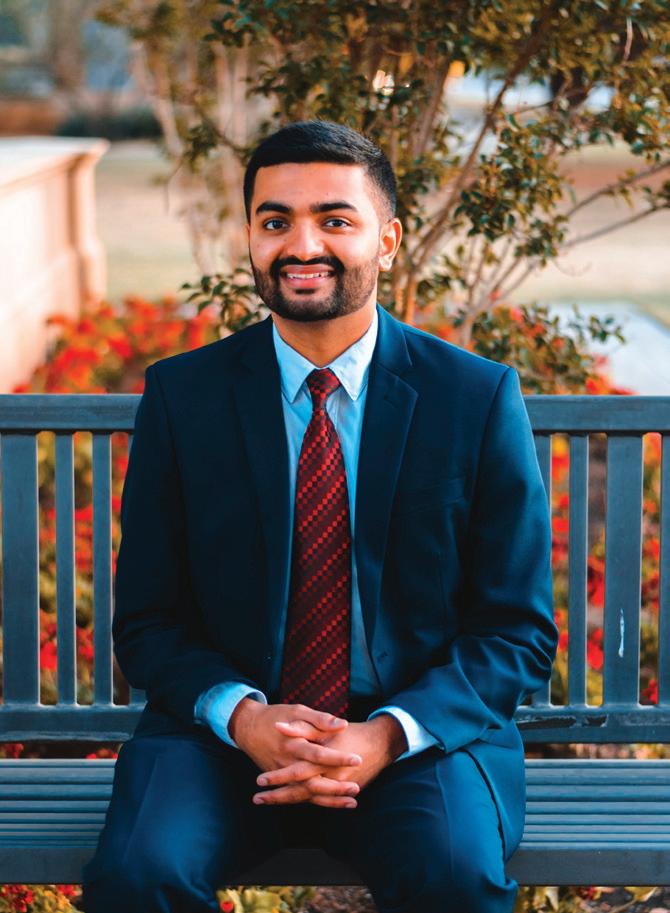

“Private
“Your generous scholarship support provides an avenue for students to focus more attention on our education and worry less about how we will pay for it. Opportunities for community outreach experiences wouldn’t happen if I had to get a part-time job.”
“Annually, TTUHSC provides about 600,000 patient visits through our clinics and affiliated hospitals, and generous private support enables us to enhance existing services or develop new programs specific to populations.”
support is critical in helping fund research and vital in sustaining investigations, which helps us move toward significant novel discoveries that will advance knowledge and improve patient outcomes.”
JANNETTE DUFOUR, PHD Professor, Cell Biology and Biochemistry
ASHER GEORGE, MPH, (BIOMEDICAL SCIENCES ’19) First-Year Medical student
LINDA MCMURRY, DNP, RN, (NURSING ’10, ’04) Director, Larry Combest Community Health & Wellness Center

Submissions for Distinguished Alumni Awards will be accepted through May 1. Visit the Alumni Relations website www.ttuhsc.edu/alumni for nomination forms.




“I waited four years to walk up those stairs to receive my white coat, and I always looked forward to the experience of receiving it,” said Ikechukwu Achonye, class president in Amarillo. “When I got cloaked, I had this feeling of accomplishment and reality. All those years of hard work and sacrifices culminated into this feeling of growth. Then it dawned on me that there is more to do, and that even better days are in sight.”
For Jerry H. Hodge School of Pharmacy students, it was equally valuable that the coats were sponsored by Walgreens, a company filled with people living the career to which they aspire.

